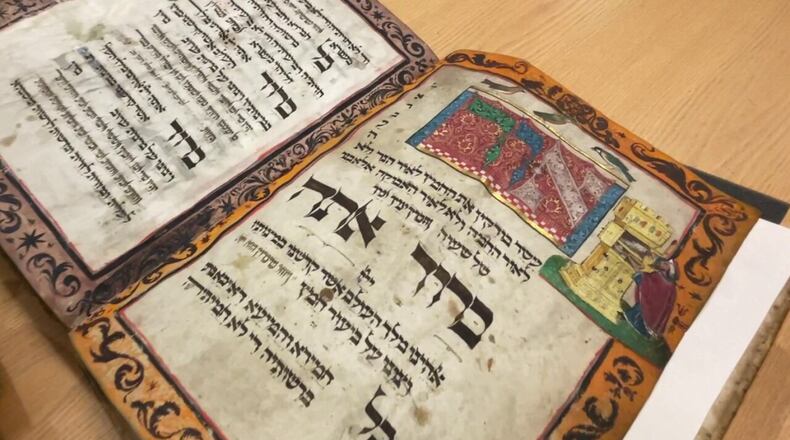Hebrew Union College-Jewish Institute of Religion has already appeared to take steps toward selling rare books and manuscripts from its world-famous Klau Library. School officials said no sale is imminent, yet the school’s director of libraries resigned in February citing pressure to sell rare books, according to his resignation letter.
Then, in March, two representatives from Sotheby’s auction house visited the Klau Library to evaluate its possessions.
RELATED: Most of the students have left Hebrew Union College. Rare books could be next.
“These sacred texts are invaluable artifacts — religious and cultural treasures,” said Yost in a press release. “Their sale would not only betray donor trust but also may violate legal restrictions placed on the gifts.”
Yost said he’s seeking the restraining order because donors over the years have contributed to finding the Klau Library’s care and contents.
According to Yost’s announcement, the library’s collection includes 14,000 items in the Rare Book Room, some of which are potentially worth millions of dollars.
“The texts were entrusted to the library with the understanding that they would be preserved and maintained for use by scholars and researchers worldwide,” says the press release. “The academic community relies on access to these texts — an integral part of the library’s public service and educational roles.”
If the collection is sold, Yost said he’s concerned items will vanish into private libraries, instead of remaining within the public’s access as donors intended. He also said using the proceeds from sold items initially given by a donor in order to reduce the school’s deficit could be an illegal use of assets.
In an email to the I-Team, spokeswoman Patricia Keim wrote that HUC-JIR is “committed to ensuring that the Klau Library maintains its critical role in research, scholarship, and the Reform Movement and we hope to maintain the Cincinnati campus as a hub for research, gatherings, and academic pursuits.”
But it also faces “notable headwinds,” including a “long-term enrollment decline and changing environment for clergy education.” So, “business as usual is not an option.”
“While we have no current plans to sell any part of our collection, it would be irresponsible to foreclose such actions should they be deemed necessary to preserve and maintain the collection and access to it,” Keim wrote. “In any case, any such decision would be carefully reviewed and require approval by the Board of Governors.”
The Sotheby’s visit and resignation of Libraries Director Yoram Bitton were first reported by Minneapolis journalist Lev Gringauz, whose Cincy Jewfolk article in April said HUC-JIR faced a $6.5 million budget deficit in its 2024 fiscal year.
Bitton’s resignation letter said he didn’t want to go against the library’s mission “by selling the treasures of the Jewish people to the highest bidder.”
Why it matters
Meyer said the Klau and American Jewish Archives have an unrivaled collection of books, manuscripts, periodicals and recordings that document Jewish life over centuries in China, Europe and the United States.
“This is one of the two or three most important Jewish libraries in the world,” Meyer said. “I have at times been approached by other institutions (to) join their faculty. A principal consideration for me in remaining here was this library.”
Established in 1875, the Klau contains more than 14,000 rare books, including the world’s largest collection of Chinese manuscripts that identify Jewish families dating back to Ming dynasty and a polyglot version of the Book of Psalms created in 1516.
Polyglot texts are used by biblical scholars to compare translations and document observations about specific verses. The Klau’s five-language text is believed to capture the first time Christopher Columbus’ name was used in print.
“Now, the reason I open to this page, Psalm 19, is it says something like the word of the lord will go to the ends of the earth,” explained Jordan Finkin, deputy director of libraries at HUC. “If we look in the footnotes, (readers find a Latin phrase suggesting) Christopher Columbus is fulfilling the prophesy.”
The book was published in Columbus’ hometown of Genoa, Italy just 26 years after the explorer is said to have discovered America.
“So, it’s ‘native son makes good,’ right? I mean, that’s what rare books have is good stories,” Finkin said.
Whether or not rare books are sold soon, Zola questions whether the library and archives can survive without daily visits by the rabbinical students and budding historians who’ve called the Cincinnati campus home for more than a century.
In addition to closing the rabbinical program, HUC-JIR phased out graduate programs in 2023.
“I personally know of no example in the world where an academic library and an archival research center exist thousands of miles away from the academy itself,” Zola said. “Show me an example of how this works. I don’t understand how you can expect to actualize a plan when there is absolutely no precedent for success.”
About the Author
